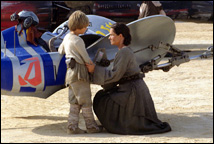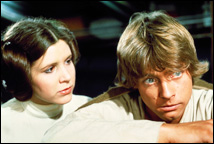
Science fiction fills
mythological role
"A long time ago in a galaxy far, far away ..."
Darth Vader's family tree Anakin Skywalker's mother, Shmi, supposedly conceived him by the will of the Force.
 Anakin romances Queen Amidala of Naboo.
 The twins Leia and Luke were born to Amidala but hidden from Darth Vader.
 Leia, raised as a princess, eventually hooked up with the heroic mercenary, Han Solo.
Photos Courtesy Lucasfilm, Ltd.
The famous helmet The helmet that so many fans immediately respond to has a simple origin.
The helmet that so many fans immediately respond to has a simple origin.Some 30 years ago, George Lucas contracted concept artist Ralph McQuarrie to envision Vader's suit. "It was kind of a Japanese influence," Lucas says. "I basically described a character that was covered in armor. Had a black cape. Had a breath mask because he couldn't breathe. A half-robot, half-human. And he had a kind of samurai helmet. ... Ralph just started sketching stuff, and I would say, 'Make it more like this or more like that.' But very quickly he got that look down."
|
Why? It's just a movie. And the first one, "A New Hope," was the biggest of all, and it's so ragged and pinned together technically -- it burst with a giddy, amateur foolishness that was so unlike the glossy sneer Hollywood usually stamps on its work product.
But it filled a void, a great, echoing emptiness at the core of the American experience, one we didn't know was there. "Star Wars," about faraway worlds, bizarre aliens, hurtling mechanisms and arcane, ritualistic codes of behavior, simply felt like coming home. It is comfortable and comforting.
We're talking about a mythological landscape. The shared place in the cultural imagination where avatars and archetypes keep testing the rules of social behavior. The place we project ourselves within, the common lodestone of social identity. Mythology in the sense of telling tales around a campfire and gazing into the magic of the flames -- it hasn't changed in thousands of years. Mythology, not in the sense of shelf-life hype, shrill vanity and nailing pieces of rotting merchandise together and selling it as Ryan Seacrest -- no, it's all about the storytelling, although it has to be the right storytelling framework, and slotted into the Zeitgeist of the period. Like a hero, "Star Wars" came along when we needed it most. You're my only hope, Obi-Wan George Lucas.
The cultural blueprints for "Star Wars" are well known and discussed to death. A clever scrap of story, not too much explained, just enough to exercise your sense of wonder and imagination and therefore buy into the event, became enfranchised by it, seduced as a participant -- some Joseph Campbell "Hero of the Thousand Faces" deep-think, a romance lifted from "Gone With the Wind," quite a lot of "La Morte d'Artur" scissored and interwoven with Kurosawan samurai, the reverence for machinery from "The Dam Busters" and the horror of technology from "Metropolis" -- yes, the same impulses coexist, and do in most of us -- and the pure puppy love of quick-cut adventuring that was epitomized by movie serials of the '30s, the visual-storytelling equivocation of the sound bite. Movies move.
What had happened was that the Western, the American mythological landscape that had served us well for a century, from penny dreadfuls to "Gunsmoke," was wheezing, on its deathbed, flat-lined, stake poised above the flittering heart. The Western seemed false and fake by the '70s, done in by the brutal cynicism of Vietnam and Watergate, by Charles Manson and Pol Pot. There was nowhere to go but the horror movie -- and there were some splendid horror movies done in that period -- but no one comes out of a horror movie excited about the wonders of possibility.
Hey, despair and death are no fun at all! The other dipole of human existence is creation and invention, the legacy we pass down, and we needed a storytelling framework to express this in. In stepped science fiction, the province of geeks and nerds and library-haunters, the kids who, when they grew up, went to Hollywood, because that is the place where dreams are a grown-up business.
"Star Trek" led the way. It created the mythic road map for a new generation of storytellers and story-absorbers, and it gradually took over the pulse of pop culture. Gene Roddenberry -- a World War II pilot whose reverence for the traditional, almost Franciscan cant of the military was tempered by the dialect of imagination and individualism -- deliberately created a "western in outer space" where the look was different, so the suits thought it was different, but it was really the 3,000-year-old "Odyssey" with Spock and Bones voicing aloud the dualistic drives of the hero's inner journey.
The silly playfulness of science fiction took over as the nation's mythology, of which the movie industry was a barometer. Few "science fiction" movies or TV shows had the weight of real ideas slowing them down. It was all window dressing, but the fiction was hard to resist.
Alas, Hollywood loves to turn creative spark into formula, and it looks like the science-fiction flirtation is puffing in the stretch. The last "Star Trek" and the last "Star Wars" occurred and will occur this week. At the same time, the need for a mythological landscape that gives meaning to real life has never been greater, given the extreme and cannily alarmist cynicism of modern times.
What will replace it? The drift for serious, creative storytelling is in the ancient past, the world of "The Lord of the Rings, "Gladiator," of "Troy" and the new, splendid film "Kingdom of Heaven." These are the sorts of tales once spun around the campfire.
What's old is new again. But George Lucas already knew that.
en.wikipedia.org/wiki/Mythology#Modern_mythology
Star Wars - The Official Website
www.starwars.com
[News] [Business] [Features] [Sports] [Editorial] [Do It Electric!]
[Classified Ads] [Search] [Subscribe] [Info] [Letter to Editor]
[Feedback]
